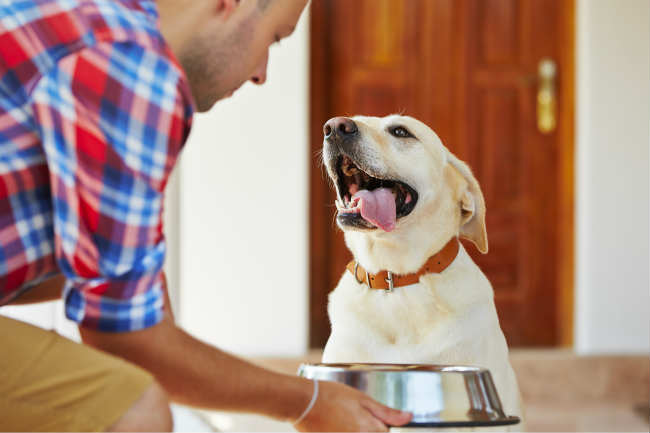
This post may contain affiliate links. We are compensated for referring customers to our affiliate partners.
 In my opinion, most commercial dog foods for senior dogs are awful. Neither AAFCO nor the National Research Council which puts out nutritional recommendations for feeding dogs has made any recommendations for the feeding requirements for senior dogs. As a result, dog food companies make up their own feeding guidelines when it comes to senior pet foods. Senior foods are all over the map when it comes to protein, fat, carbohydrates, fiber, and vitamin/mineral content. Most pet owners believe that their senior dogs should be fed a diet that is different from a dog in the prime of life, but no one knows what to feed older dogs. Only about half of those people are feeding their dog a senior diet. In reality, a dog’s diet should always be based on his individual needs and not just his age.
In my opinion, most commercial dog foods for senior dogs are awful. Neither AAFCO nor the National Research Council which puts out nutritional recommendations for feeding dogs has made any recommendations for the feeding requirements for senior dogs. As a result, dog food companies make up their own feeding guidelines when it comes to senior pet foods. Senior foods are all over the map when it comes to protein, fat, carbohydrates, fiber, and vitamin/mineral content. Most pet owners believe that their senior dogs should be fed a diet that is different from a dog in the prime of life, but no one knows what to feed older dogs. Only about half of those people are feeding their dog a senior diet. In reality, a dog’s diet should always be based on his individual needs and not just his age.
- Ready To Switch To Senior Dog Food? See A List Of Top Customer Rated Senior Dog Food
Senior Dog Food Is Not For All Older Dogs
Dr. Lisa M. Freeman, a professor at the Cummings School of Veterinary Medicine at Tufts, recently conducted a survey to find out what pet owners thought about senior pet foods and what they were feeding their dogs. According to the survey, many people believed that senior dog foods were lower in calories and contained less fat, protein, and sodium.
However, that’s not what Dr. Freeman and her colleagues found. They tested 37 senior dog food formulas. The foods didn’t necessarily have decreased levels of those ingredients. Plus, calories per cup varied greatly, ranging from 246 per cup to over 400.
Most of the commercial foods tested by Dr. Freeman and her colleagues in the study had the following in common:
- Fewer calories
- Less protein
- Reduced levels of phosphorus and sodium
- Increased fiber
- The addition of supplements such as omega-3 fatty acids, joint supplements such as chondroitin and glucosamin, and antioxidants
The problem is, this profile for a senior food is not beneficial to some or even most older dogs. If you have an older dog who is not overweight, feeding this kind of food would be a disaster. It’s very telling that some dog food companies sell their senior dog foods as both senior and weight management foods! I don’t know about you, but my older dogs have all started to lose weight as they have aged. The last thing I wanted to do was feed them a product that had reduced calories or lower protein.
The truth is that there have been very few studies done on what kind of nutrition dogs need as they age. Instead of buying a food that has less protein and fewer calories, the most important thing is to consider your dog’s individual condition and make sure his specific needs are being met.
Let’s look at some of the problems with this approach to senior dog foods.
Not All Senior Dogs Are Overweight
If your senior dog is at a good weight or starting to lose weight, then feeding him a food with reduced calories is a bad idea. Senior dogs start to lose weight for many reasons:
- As dogs age their sense of taste and smell begin to fade, making dog food less appealing
- A senior dog’s appetite can diminish
- Senior dogs can have dental problems which make it harder for them to eat, especially kibble
- Senior dogs can have underlying health conditions that make them lose weight
There are lots of other reasons why a senior dog may be less interested or unable to eat. Anyone who has had a senior dog knows that getting an older dog to eat well can be a chore! You don’t need to give one of these dogs reduced calories. Instead, I would recommend feeding them a food with lots of calories. Either continue to feed the dog’s adult maintenance food or switch to an easy-to-digest food with more calories. And think about topping it off with some stew (chicken and sweet potatoes is good) to make it taste better to your old guy. Try adding some water to kibble and warming up the food. This will also make it taste better.
If your dog is reluctant to eat, have your vet check his mouth and teeth to see if he has any dental or gum problems. A bad tooth can keep an old dog from eating. Get the tooth fixed and your dog might have a good appetite again.
If your older dog is overweight, then it’s better to help him lose weight by controlling his portion size and helping him get a little daily exercise than using a lower calorie dog food.
Senior Dog Food Needs Protein
Contrary to what many people think, senior dogs still require good protein as they get older. In fact, studies have shown that your older dog needs more protein as he ages, not less. And the protein needs to be from good sources of meat protein. Good quality protein will help your dog maintain healhty muscle mass instead of having his muscles begin to atrophy. It will also help him maintain good organ and immune functions.
Of course, you’re probably thinking that older dogs should avoid protein because it can be hard on their kidneys. Nope. A healthy older dog won’t have any problem with protein. If your dog has kidney disease or is in renal failure, he should have reduced protein, but that’s not true of most older dogs.
Fiber Content Of Senior Dog Food
Many senior foods also have increased fiber, in the belief that senior dogs, like senior humans, are often constipated. While it’s true that some older dogs can have issues with constipation as their digestive system slows down with age, this isn’t true of all dogs. The additional fiber found in many senior dog foods will make dogs potty more but it will also prevent them from absorbing the nutrients in the food that they need, so the excess fiber is counterproductive.
Instead of buying a senior food that contains added fiber you can add some healthy probiotics to your dog’s food such as yogurt. You can also buy probiotics made for dogs. The Whole Dog Journal has a good article on probiotics here
You should also make sure your senior dog gets plenty of exercise. This will help his digestion and help counteract a tendency to constipation. And don’t forget to provide water for your dog at all times. Water certainly helps keeps things moving.
Canned pumpkin is another way to counteract constipation (and diarrhea). If your dog is having problems you can give him 1 teaspoon per 10 pounds of body weight once or twice per day on his food. Be sure to use canned pumpkin and not pumpkin pie filling. Your dog shouldn’t have the spices in the pie filling.
What About Added Supplements In Senior Dog Food?
It’s true that some senior foods do add omega-3 fatty acids, joint supplements, and antioxidants. But the truth is that it’s not wise to count on dog foods for your dog’s supplements, even if you are using the very best of dog foods. Commercial foods are manufactured at high temperatures which can ruin oils like omega-3 fatty acids. Joint supplements like chondroitin and glucosamin are added in small amounts in pet foods and then mixed into the food. It’s always hard to be sure they are mixed evenly throughout the food.
There is anecdotal evidence that these supplements do help senior dogs so if you would like to give them to your dog it’s probably best for you to add them to your dog’s diet separately from his food. Fish oil gel-tabs, krill oil, salmon oil, and other fish sources of omega-3 fatty acids are available in health food stores and pharmacies. You can also find chondroitin and glucosamin in health food stores and pharmacies. Other products that can help senior dogs include MSM, green-lipped mussels, and DHA. Talk to your vet about other things he or she might recommend. If your senior dog is experiencing any pain due to arthritis or other joint problems, your vet might recommend a mild pain killer.
Alternatives to Commercial Senior Dog Food
You should be able to find a good commercial food to feed your senior dog, whether you continue to feed an adult maintenance formula, a senior food, or an easy-to-digest food. If your senior dog has a particular health issue, you will need to find a food that takes that issue into consideration. However, some people prefer to change their senior dog’s diet to a raw or homecooked diet. Senior dogs are often better able to digest these foods than the food in a commercial pet food, so that’s something for you to consider.
I’ve used a homecooked diet for several of my older dogs when they began to lose interest in kibble as they got older. I think with a couple of my older dogs it added years to their lives. It’s a lot of work, but it became a routine for me and I was happy to do it. I certainly fed my dogs lots of protein and gave them lots of calories. I have Setters. My dogs and the other dogs I know don’t tend to be fat when they age. They stay very active into their teens and they use a lot of calories.
So, if you have a senior dog, think carefully about what you are feeding him. Remember that there’s currently very little science behind the formulas for senior pet foods. Consider your dog’s individual condition and what he needs. Most of the senior pet foods being made today have reduced calories and lower protein and that’s not good for a lot of senior dogs.
